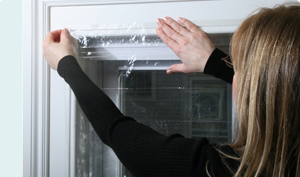It's almost time for you snowbirds to fly south for the winter. Before you go, you must winterize your summer home for colder weather and protected against freezing temperatures, snow and ice. Winterizing your summer home for cold weather requires a bit of work, but this do-it-yourself project can be completed in a weekend. You may need a hand from a professional to clear water from all the pipes and to shut off propane or natural gas. Plus you may want to hire an exterminator, a landscaper or a homesitter to help you take care of things while you're away. The best time for winterization is two or three days before you leave. Take care of gutter and downspout cleaning, HVAC unit winterization and outdoor faucet insulation first. Leave water main and power shutoff for after you cook one meal for the road and take your last shower. The following is a list of ten things you should consider when winterizing your vacation home?
Be sure to check back with the Frost King blog for tips on how to take good care of your home. For more timely advice, bookmark this blog, like us on Facebook and follow us on Twitter. Frost King has everything you need to winterize your vacation home before you leave. Find our products at these home improvement retailers. If you have questions about installing and using any of our DIY home winterization products, view our FAQs, call 1-800-299-5700 or contact us.
